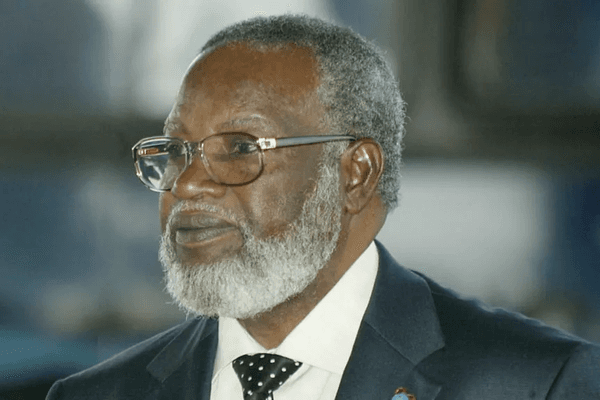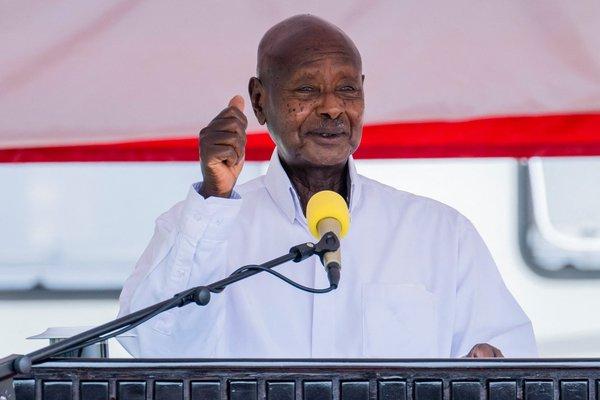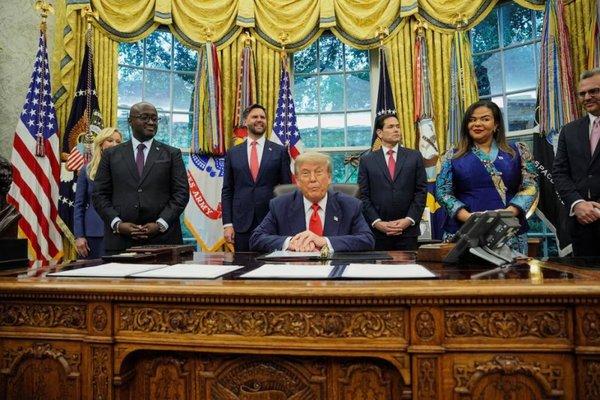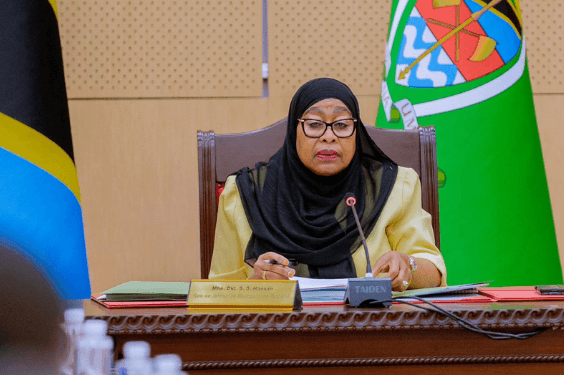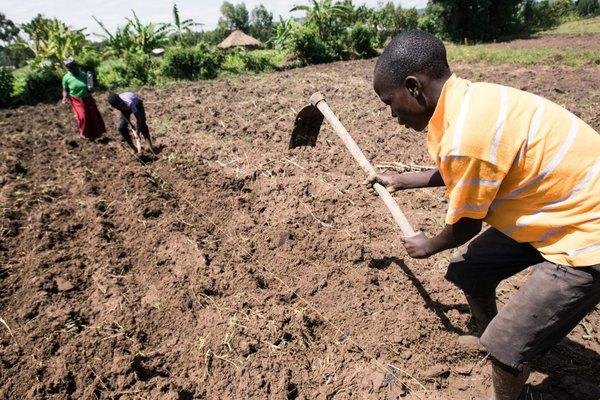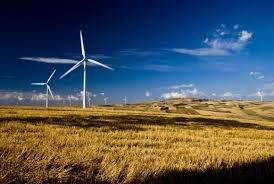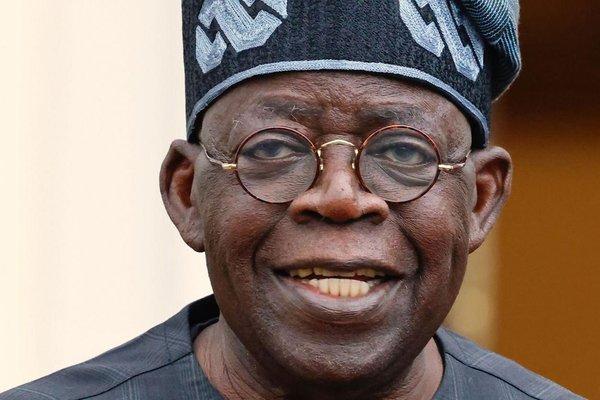Ghana
Ghana is a West African country known for its rich history, cultural diversity, and significant role in the region’s politics and economy. It lies along the Gulf of Guinea and the Atlantic Ocean, bordered by Côte d'Ivoire to the west, Burkina Faso to the north, Togo to the East, and the Atlantic Ocean to the South.

West Africa

238,533 sq km

GMT+0

33.8 Million (2023)

English, Akan

Christianity, Islam

Ghanaian cedi (GHS)

Nana Addo Dankwa Akufo-Addo

Brief
Ghana, known as the Gold Coast during its colonial period, has a rich and diverse history that stretches back centuries. The modern state of Ghana emerged from a series of powerful kingdoms, colonial influences, and movements for independence.
Before European contact, the region that is now Ghana was home to powerful kingdoms and empires. The Ghana Empire (c. 300–1200 AD), located to the north of modern Ghana, was a major trading empire known for its wealth in gold. However, it was the Ashanti Empire, centered in the southern part of the country, that became the most prominent kingdom during the pre-colonial period. The Ashanti Empire flourished from the 17th century until it was defeated by the British in the early 20th century.
Other significant groups in Ghana's history include the Mole-Dagbani, Ewe, Ga, and Fante peoples, who all contributed to the rich cultural and political landscape of the region.
In the late 15th century, Portuguese explorers arrived in what is now Ghana, drawn by the region’s abundant gold. Other European powers, including the Dutch, French, and British, soon followed, establishing trade routes for gold, ivory, and enslaved people. The British eventually gained control of the coastal regions, and Ghana became a British colony known as the Gold Coast in 1874.
During the colonial period, the British established forts and trading posts along the coast, while the Ashanti and other local kingdoms fought to maintain their independence. The Ashanti-British wars, particularly the Anglo-Ashanti Wars, were pivotal events in the region's resistance against British control. The Gold Coast was officially unified under British rule in the early 20th century.
The movement for independence in Ghana began in the early 20th century, led by nationalist leaders leike Kwame Nkrumah, who was educated in the United States. Nkrumah and othrs called for self-rule and an end to colonial domination.
In 1957, after years of political struggle, Ghana became the first sub-Saharan African country to gain independence from colonial rule. This historic event took place on March 6, 1957, with Nkrumah becoming the first Prime Minister (later President) of Ghana. Nkrumah's vision for a united and Pan-African continent became a defining feature of his leadership.
After Ghana’s independence, Nkrumah’s government initially made strides in education, infrastructure, and healthcare but faced challenges due to economic difficulties and increasing political opposition. In 1966, Nkrumah was overthrown in a military coup while he was in China, marking the beginning of a series of military coups and political instability.
For the next several decades, Ghana experienced alternating periods of military and civilian rule. There were numerous coups, including the 1979 coup, which led to the brief rule of Flight Lieutenant Jerry John Rawlings, who later became a key figure in Ghanaian politics.
Rawlings transitioned from military leader to civilian president after Ghana’s first multi-party elections in 1992, marking the beginning of a stable democratic era. Under Rawlings, Ghana saw significant economic reforms, and the country emerged as one of Africa’s most democratic nations.
Since the early 1990s, Ghana has maintained a relatively stable democratic system with peaceful elections and transitions of power. The 2000 election marked the first peaceful transfer of power between two different political parties when John Kufuor of the New Patriotic Party (NPP) succeeded Rawlings.
In 2016, Nana Akufo-Addo of the New Patriotic Party (NPP) won the presidency, defeating incumbent John Dramani Mahama of the National Democratic Congress (NDC). Akufo-Addo was re-elected in 2020, and his leadership has focused on economic reforms, education, and industrial development.
Ghana continues to be one of the most stable and prosperous democracies in West Africa, and it plays an important role in the African Union and other regional organizations.
Photos and Videos



National anthem
Cultural Life
Cultural milieu
Ghana is renowned for its rich cultural heritage, which is a blend of ancient traditions and modern influences. Its cultural milieu is shaped by a multitude of ethnic groups, languages, religions, and customs, creating a vibrant and dynamic society. Ghana is home to over 100 ethnic groups, each with its own distinct traditions, language, and social structure. The four largest ethnic groups in Ghana are Akan, Mole-Dagbani, Ewe, and Ga-Dangme. The Akan people form the largest ethnic group in Ghana and dominate the southern and central regions of the country. The Ashanti (or Asante) are one of the most influential sub-groups, known for their rich history, traditional monarchy, and the famous Ashanti Kingdom. The linguistic diversity in Ghana is one of the most remarkable aspects of its culture. The official language is English, but Ghana has over 80 indigenous languages spoken across the country. Ghana is a religiously diverse country, with a mix of Christianity, Islam, and Traditional African Religions. The majority of Ghanaians (about 71%) identify as Christians, with many practicing Protestantism, Roman Catholicism, or Pentecostalism. Christianity has influenced Ghana’s festivals, holidays, and social practices. About 18% of the population practices Islam, particularly in the northern regions. The country has a long history of Islamic influence, and the Muslim community contributes significantly to the culture. Around 5% of Ghanaians adhere to indigenous beliefs. These religions involve the worship of ancestors, spirits, and deities, often connected to nature, animals, and the land. Rituals, ceremonies, and festivals play an important role in these faiths. Festivals are a cornerstone of Ghanaian culture and offer insight into the country’s traditions, history, and religious practices.
Some notable festivals include: Akwasidae (Ashanti Festival): A major cultural and religious celebration in the Ashanti Kingdom, held every six weeks to honor the Ashanti King (Asantehene) and celebrate their rich history,
Homowo: Celebrated by the Ga people in Accra, Homowo is a harvest festival with roots in traditional agricultural practices. It involves drumming, dancing, and feasting, Eid al-Fitr: The Muslim community celebrates the end of Ramadan with festive prayers, feasts, and community gatherings, Christmas and Easter: As in many other African countries, Christmas and Easter are widely celebrated by Christians, marked by church services, family gatherings, and communal meals, Fetu Afahye: This festival, celebrated by the Fante people in the Central Region, marks the end of the harvest season with traditional dances, music, and feasting. Music and dance are central to Ghanaian culture and are deeply embedded in everyday life, from celebrations to religious ceremonies. Ghanaian food is diverse, rich, and flavorful, with staple ingredients like maize, cassava, plantain, rice, and beans.
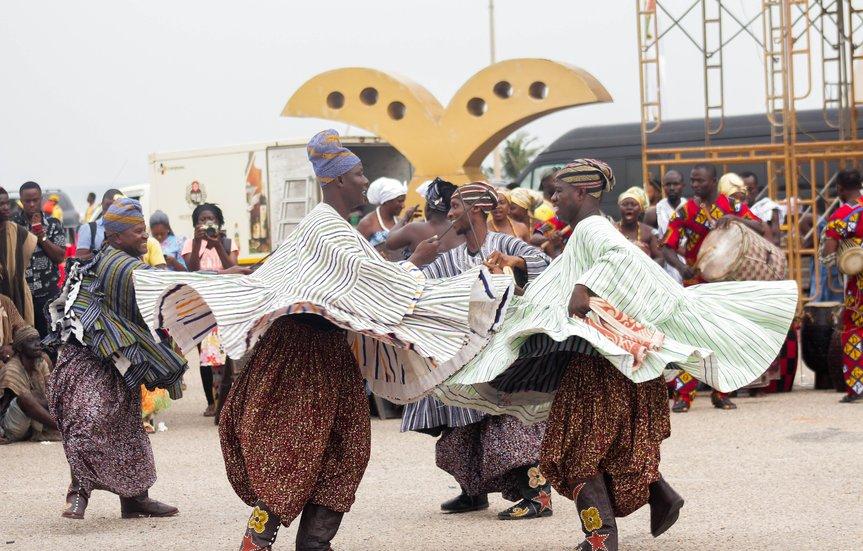



Cuisine
Ghanaian cuisine is rich, diverse, and flavorful, heavily influenced by the country’s ethnic groups, agriculture, and history. It features a variety of staples, grains, vegetables, meats, and fish, often combined with aromatic spices, herbs, and hot peppers. Ghana’s cuisine relies on a few staple ingredients that form the base of many meals. Rice is a central part of Ghanaian cuisine. It is served with various soups, stews, or fried with meats, fish, or vegetables. Maize is commonly used to make dishes like banku, kenkey, and corn dough. Cassava is a root vegetable is used to make dishes like fufu and gari (fermented cassava flakes).




Music
Ghana has a rich and vibrant music scene, which is deeply embedded in the country's culture and heritage. Music in Ghana plays an important role in social, religious, and ceremonial events, and it is an essential form of expression across the country's various ethnic groups. Ghanaian music is diverse, encompassing traditional genres, modern popular music, Gospel, and international influences. Ghana has a thriving gospel music scene that plays a significant role in the country's cultural and religious life. Gospel music in Ghana is very popular among the Christian community and has grown to become one of the dominant music genres in the country. The music typically focuses on messages of faith, hope, praise, and worship, and is often heard in churches, during religious events, and on radio and television programs. Traditional music in Ghana is deeply linked to the customs and daily life of its people. Each ethnic group has its own musical forms, instruments, and styles. The music often accompanies dances, rituals, celebrations, and storytelling. Traditional Ghanaian music is known for its complex rhythms, with drums being the dominant instrument. The most popular drums include the djembe, talking drum (atumpan), balafon, and drum ensembles. Drumming plays an important role in ceremonies, social gatherings, and even in communicating messages over long distances. Call-and-Response is a characteristic feature in many Ghanaian traditional songs, where the lead vocalist sings a line, and the group or audience responds. This creates an interactive and engaging musical experience. Music and dance are inseparable in Ghana. Every ethnic group has its own unique dance styles associated with its music, such as the Adowa dance (Ashanti), Agbadza (Ewe), and Bawa (Dagombas). Highlife is one of the most iconic music genres in Ghana, which blends Western styles with traditional African rhythms. It emerged in the early 20th century and has since become a dominant music style in the country and beyond. Hiplife is a more modern genre that emerged in the 1990s and is often seen as a blend of highlife and hip-hop. Hiplife reflects Ghana’s youthful energy and is a popular genre among young people in the country and across West Africa.




Ghanaian music
The arts
Ghana has a vibrant and rich artistic heritage, deeply rooted in its diverse ethnic cultures and traditions. The arts in Ghana span various forms, from visual arts like painting, sculpture, and textile design, to performing arts such as music, dance, and theater. Ghanaian arts are not only expressions of creativity but also carry deep cultural significance, representing history, spiritual beliefs, social structures, and worldview. arious art forms that have shaped Ghana’s cultural identity are; Visual Arts, Painting and Modern Visual Arts, Performing Arts, Crafts, and Cultural Significance of the Arts.
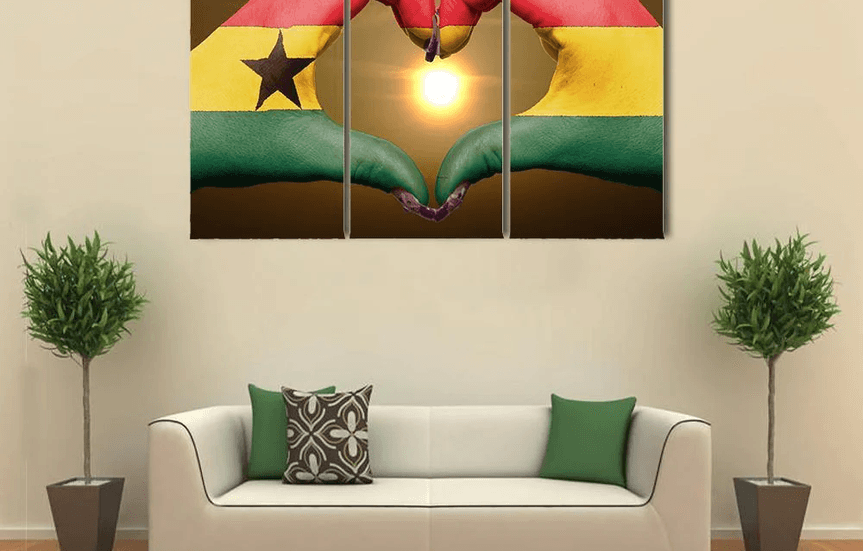




People
Ethnic groups
Ghana is a culturally rich and diverse country with a wide range of ethnic groups. The population of Ghana is made up of over 100 different ethnic groups, each with its own language, customs, and traditions. The major ethnic groups in Ghana are often classified by the regions they inhabit and their historical and cultural connections. The key ethnic groups in Ghana are; Akan People, Mole-Dagbani People, Ewe People, Ga-Dangme People,Gurunsi (Gurma) People, and Hausa People. The Akan are the largest ethnic group in Ghana, comprising about 45% of the population. The Akan are mainly found in the central and southern regions of Ghana, particularly in the Ashanti Region, the Western Region, and the Eastern Region. The Mole-Dagbani ethnic group is one of the largest ethnic groups in northern Ghana. They are mainly found in the Northern Region, particularly in the Dagomba, Mamprusi, and Nanumba areas.




Religion
Religion plays a central role in the lives of many Ghanaians, with a rich diversity of beliefs and practices. Ghana is a multi-religious country, where various religions coexist, and the religious landscape is shaped by historical, cultural, and societal influences. Christianity is the dominant religion in Ghana, with an estimated 71% of the population identifying as Christian. It has a deep historical and cultural connection with the country, primarily due to the influence of European missionaries during the colonial era. The majority of Ghanaian Christians are affiliated with Protestant denominations, followed by Catholicism and Charismatic groups. Islam is the second-largest religion in Ghana, with around 17% of the population identifying as Muslim. Islam was introduced to the country by trans-Saharan traders and missionaries from the 11th century onward, particularly in the northern regions. Ghana’s Muslim population has grown steadily, and Islam is particularly strong in the northern and coastal regions. A significant portion of Ghanaians, particularly in the rural and ethnically diverse regions, practice traditional African religions, although the exact percentage is difficult to determine (approximately 5-10%). These beliefs are deeply embedded in the culture, customs, and rituals of various ethnic groups in Ghana. Ghana is known for its religious tolerance and peaceful coexistence between different religious groups. Christians, Muslims, and adherents of traditional African religions often live side by side and participate in each other's cultural and religious events. Ghana’s constitution guarantees freedom of religion, and people are generally respectful of one another's beliefs.

Settlement patterns
The settlement patterns in Ghana reflect the country’s geographical features, ethnic diversity, and historical development. These settlements vary greatly depending on region, cultural practices, economic activities, and the availability of resources. Ghana’s settlements can generally be divided into rural and urban categories, with each offering unique characteristics related to how people live and organize their communities. Rural settlements are the backbone of Ghana’s agricultural economy. A significant portion of the population lives in rural areas, often in small villages and towns that are predominantly involved in farming, fishing, and other agricultural activities. Urbanization has been rapidly growing in Ghana, especially in major cities like Accra, Kumasi, and Takoradi. These urban settlements are characterized by modern infrastructure, commercial activities, and industrialization, with a high concentration of the population and economic resources. Ghana has a long coastline along the Gulf of Guinea, and many settlements are based around fishing and port trade. Coastal communities tend to have a mix of traditional homes and modern structures, and fishing is a key economic activity. In regions with dense forests and mountainous terrain, such as the Eastern Region and parts of the Western Region, settlements are often more dispersed. People here rely on agriculture, particularly cocoa farming, yams, and cassava, as well as timber extraction. While Ghana’s urban settlements have flourished, they face challenges related to rapid population growth, such as: Housing Shortages and Traffic Congestion .
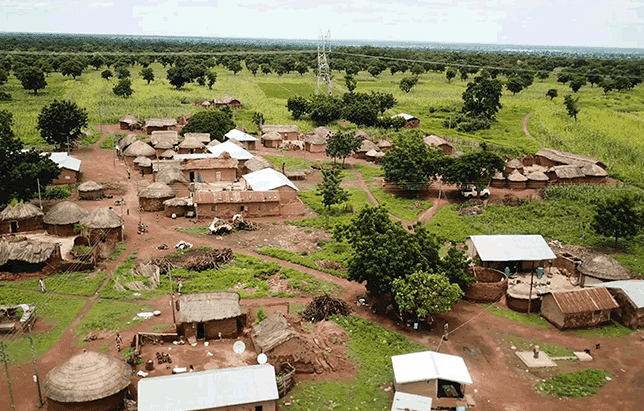
Coastal settlements, such as Elmina, Takoradi, and Tema, are traditionally fishing communities. Many of these areas have local markets for fish sales, and people rely on fishing as their primary source of livelihood.
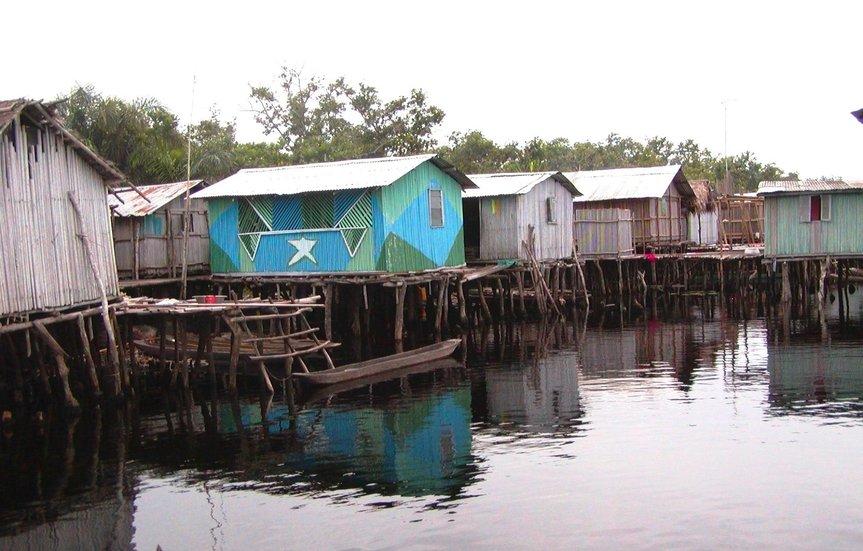
Forest and Mountainous Settlements such as the Eastern Region and parts of the Western Region, settlements are often more dispersed. People here rely on agriculture, particularly cocoa farming, yams, and cassava, as well as timber extraction. In the forested regions, settlements are often spread out due to the terrain and reliance on agricultural land for survival. The settlements in the mountains and forested regions tend to be small and closely connected to agricultural and forest resources.
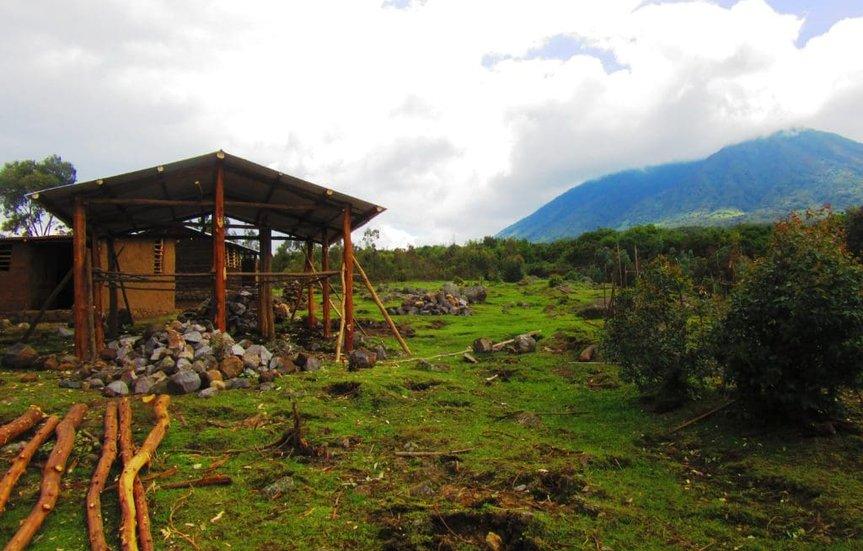
Ghana’s urban areas are more developed and have higher population densities. Accra, the capital city, is the largest city in the country, followed by Kumasi, the second-largest city in the Ashanti Region. Other major cities include Takoradi, Tamale, and Koforidua.
Modern Housing: In urban areas, housing types are varied and include modern apartment buildings, townhouses, single-family homes, and high-rise flats. The housing in the cities reflects the country’s rapid urbanization, with a mix of formal and informal settlements.
Slums and Informal Settlements: While urban areas are developing, they also face challenges such as overcrowding and unplanned growth, leading to the development of slums and informal settlements. Areas like Nima, Sowutuom, and Korle Gonno in Accra are known for their informal settlements, where people live in overcrowded and poorly built structures without adequate infrastructure.
Commercial and Industrial Centers: Urban settlements in Ghana are hubs of commerce, trade, business, and education. Accra, for example, is the economic and political heart of the nation, with bustling markets, shopping centers, and banks. Kumasi, another key city, is known for its textile industry and historical significance in the Ashanti Empire.
Transportation and Infrastructure: Urban areas have better infrastructure, including roads, electricity, water supply, and telecommunications. Public transport systems, including trotros (shared minivans) and buses, serve as key modes of transport in urban centers.




Demographic trends
Ghana's demographic trends reflect the country’s growth, urbanization, fertility rates, migration patterns, and changes in social and economic structures. The population of Ghana has steadily increased over the years, driven by natural population growth, urbanization, and improvements in health and life expectancy. Understanding these trends helps to shed light on the challenges and opportunities the country faces in terms of development, policy planning, and resource management. Ghana's population has experienced rapid growth over the past few decades. According to the 2021 Population and Housing Census (PHC), the population of Ghana is estimated to be over 32 million people, making it the 13th most populous country in Africa.

Touristic Cities
Accra (Capital City)
Accra is the capital of Ghana, on the Atlantic coast of West Africa. Kwame Nkrumah Memorial Park honors Ghana’s first president, who helped lead the country to independence. The park contains Nkrumah’s mausoleum and a museum charting his life. Makola Market is the city’s vast, colorful bazaar. Popular seafront spots Labadi Beach and Kokrobite Beach offer golden sand and high-energy nightlife. Key attractions are; Independence Square: A historical site where the country’s independence was declared in 1957, Kwame Nkrumah Memorial Park: A tribute to Ghana’s first president, featuring his mausoleum and museum, Labadi Beach: One of the most popular beaches in Accra, offering relaxation, water sports, and cultural performances, National Museum of Ghana: A place to learn about Ghana’s history, culture, and heritage, Makola Market: A bustling market that offers everything from traditional crafts to fresh produce, giving visitors an authentic Ghanaian experience.



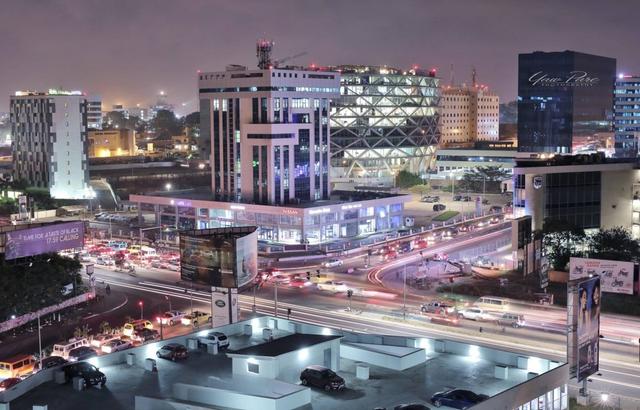
Kumasi
Kumasi, the capital of the Ashanti Region, is the cultural heart of Ghana and home to the powerful Ashanti Kingdom. The city is rich in traditions, historical landmarks, and vibrant markets. Key Attractions are; Manhyia Palace: The official residence of the Ashanti King, this palace offers insights into the Ashanti monarchy and culture,
Kumasi Fort: A historical fort built by the British during colonial times, now a museum, Kejetia Market: One of the largest open-air markets in West Africa, offering everything from crafts to food and textiles, Lake Bosomtwe: A scenic lake surrounded by mountains, located about 30 km from Kumasi. It is perfect for relaxation, swimming, and boating, Adanwomase Kente Weaving Village: Known for its handwoven Kente cloth, a symbol of Ghanaian culture.
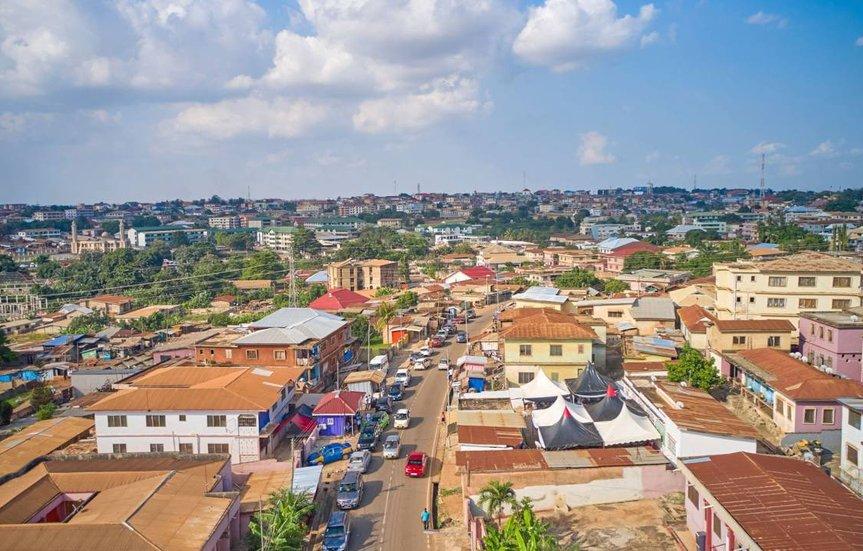
Cape Coast (Historic City)
Cape Coast is a historic coastal city that played a major role in the transatlantic slave trade. It is home to one of the most significant historical sites in Africa. It's the capital of the Cape Coast Metropolitan District and the Central Region, and is situated on the Gulf of Guinea.




Takoradi (Port City)
Takoradi, located in the Western Region, is a busy port city with beautiful beaches, cultural experiences, and a growing tourism sector. Key Attractions include Axim Beach: A peaceful beach destination, perfect for relaxation and coastal activities, Takoradi Market Circle: A busy market that offers a wide range of goods and is perfect for those looking to buy local crafts and produce.


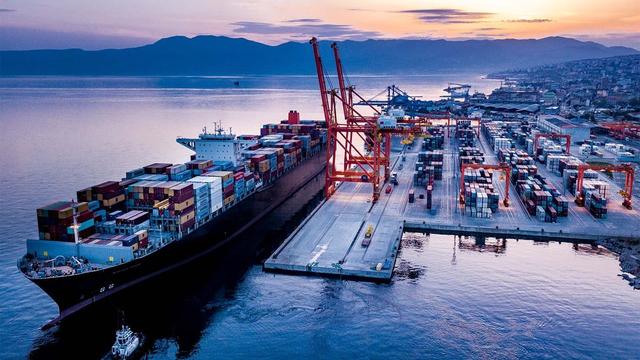
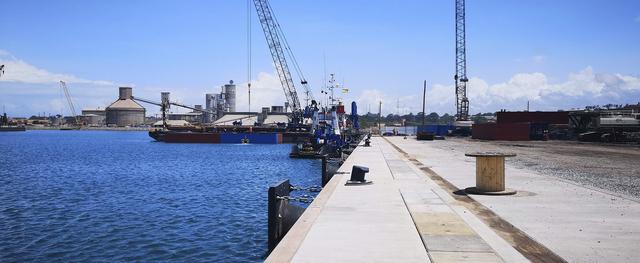
Accomodation
Guest houses
Guest houses in Ghana are an excellent option for travelers seeking a more intimate and affordable stay compared to traditional hotels. They offer a homely atmosphere and often reflect the local culture and hospitality. Many guest houses in Ghana are located in both urban and rural areas, providing various levels of comfort and amenities.




Hotels and resorts
Ghana offers a wide variety of hotels and resorts catering to tourists, business travelers, and those looking for relaxation or adventure. The country boasts luxury resorts along the coast, modern hotels in urban areas, and charming lodges for nature lovers. Below are some of the best hotels and resorts across Ghana, offering excellent accommodations, services, and unique experiences.




Riads
A riad is a traditional Moroccan-style house or palace with an interior garden or courtyard. While riads are more commonly associated with Morocco, you can find similar traditional accommodations in Ghana that offer a similar charm, blending local architectural styles with modern comforts.



Campings
Ghana offers a diverse range of camping options for outdoor enthusiasts, nature lovers, and adventure seekers. From coastal areas with serene beaches to lush national parks and wildlife reserves, there are several fantastic camping destinations where you can immerse yourself in the country’s natural beauty. Whether you're interested in wildlife viewing, trekking, or simply enjoying the tranquility of nature, camping in Ghana provides a unique experience.




Requirements for Visa
Documents to be submitted for your application
- Valid Passport
- Completed Visa Application Form
- Passport-size Photographs
- Visa Fee Payment
- Travel Itinerary
- Proof of Accommodation
- Financial Proof
- Yellow Fever Vaccination Certificate
- Travel Insurance
- Invitation Letter (for Business or Visit Visa)
- Return Ticket or Proof of Departure
- Additional Documents (If Applicable)
At the time of visa issuance, please provide the following documents
- Original Passport
- Visa Application Form
- Visa Fee Payment Receipt
- Passport-size Photographs
- Yellow Fever Vaccination Certificate
- Travel Itinerary
- Accommodation Confirmation
- Proof of Financial Support
- Return Ticket or Proof of Departure
- Invitation Letter (if applicable)
- Travel Insurance (If applicable)
- Proof of Employment or Student Status (If applicable)
- Additional Documents for Minors (If applicable)
Useful links
- Ghana Immigration Service
- Ghana Embassy/Consulate (In Various Countries)
- Ghana Tourism Authority
- Ghana Health Service
- Ghana Airports Company Limited (GACL)
- Ghana National Petroleum Corporation (GNPC)
- Ministry of Foreign Affairs and Regional Integration
- Ghana Ministry of Finance
- Travel Insurance Providers
- Ghana's Weather and Climate Information
Economy of Ghana
Agriculture, forestry, and fishing
In Ghana, agriculture, forestry, and fishing are vital sectors that form the traditional backbone of the economy. Agriculture, in particular, contributes significantly to the country's GDP and provides livelihoods for a large portion of the population. The sector faces challenges but also presents opportunities for growth and development. Ghana's agricultural sector is diverse, with key crops including cocoa, yams, grains, oil palms, and kola nuts. Subsistence farming is common, with farmers using traditional methods and tools. Livestock production is important, especially in the northern regions, with cattle, sheep, and goats being common. Agriculture, forestry, and fishing contribute significantly to Ghana's GDP, accounting for 21.1% in 2023, according to the World Bank. Inland fisheries and aquaculture are important aspects of the sector, contributing to food security and income generation.

Resources and power
Ghana possesses a diverse range of natural resources and a developing energy sector. Key resources include gold, timber, bauxite, and cocoa, with gold being a major export. The energy sector relies on a mix of hydroelectricity, thermal power (using natural gas, crude oil, and diesel), and increasing investments in solar and other renewables. Ghana also exports power to neighboring countries.
Manufacturing
Ghana's manufacturing sector is domestic-oriented but relies heavily on imported inputs. Key industries include aluminum smelting, oil refining, chemicals, cement, and metal processing. The sector also encompasses light manufacturing, food processing, pharmaceuticals, and wood processing. While there's a focus on domestic sales, only a small percentage of firms engage in significant exports.
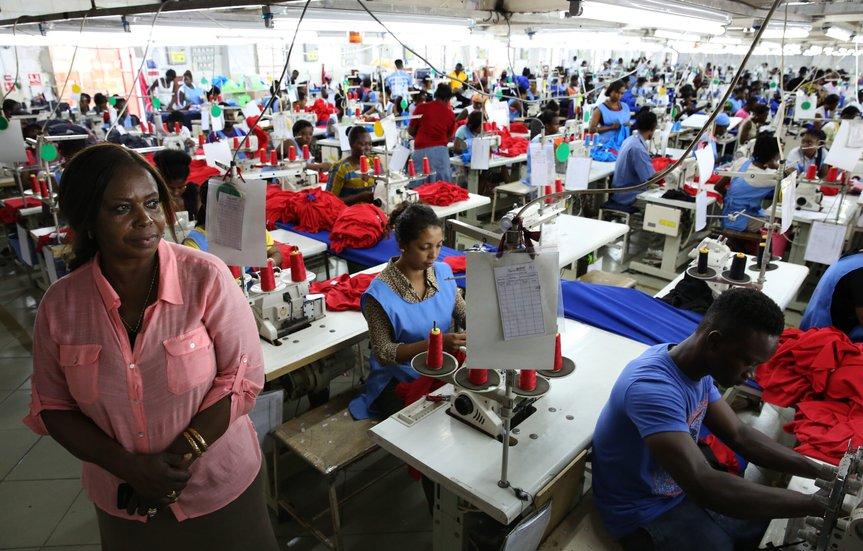
Finance
Ghana's financial landscape is characterized by a mix of formal and informal financial institutions, with the formal sector dominated by banks and microfinance institutions. The country faces challenges in financial inclusion, particularly for individuals and access to finance for firms. However, Ghana is actively working on strengthening its financial system through various initiatives, including infrastructure development, regulatory reforms, and attracting foreign investment. The country has seen a significant transformation in its financial services sector over the last few decades, with improvements in banking, microfinance, and mobile money services.
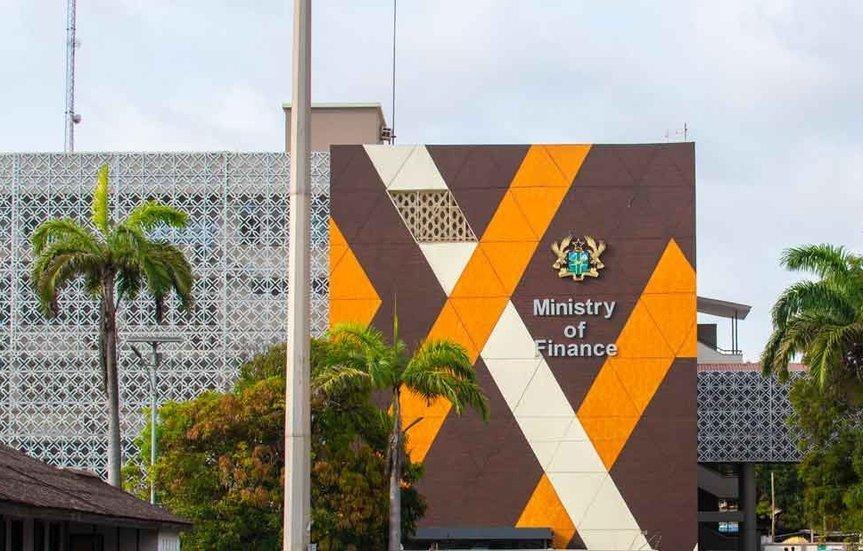
Trade
Ghana is one of the most dynamic economies in West Africa, with a growing and diversified trade sector. Trade plays a significant role in Ghana’s economic development, both in terms of exports and imports. The country’s trade sector is regulated by the government, international agreements, and private sector entities.
Ghana has rich natural resources, and its trade activities are heavily driven by exports of commodities such as gold, cocoa, oil, and timber. Ghana's main imports include refined petroleum, cars, consumer goods and delivery trucks, with China, the United States, and the United Kingdom being key import partners. The country has developed a strong trade relationship with other African countries, as well as key global partners.

Labour and taxation
Ghana's labour market has undergone significant changes in recent decades, with the country moving from a predominantly agricultural economy to a more diversified economy, which includes manufacturing, services, and mining. The government has taken steps to improve working conditions, wages, and social protection, but challenges remain, particularly in informal employment and rural areas.
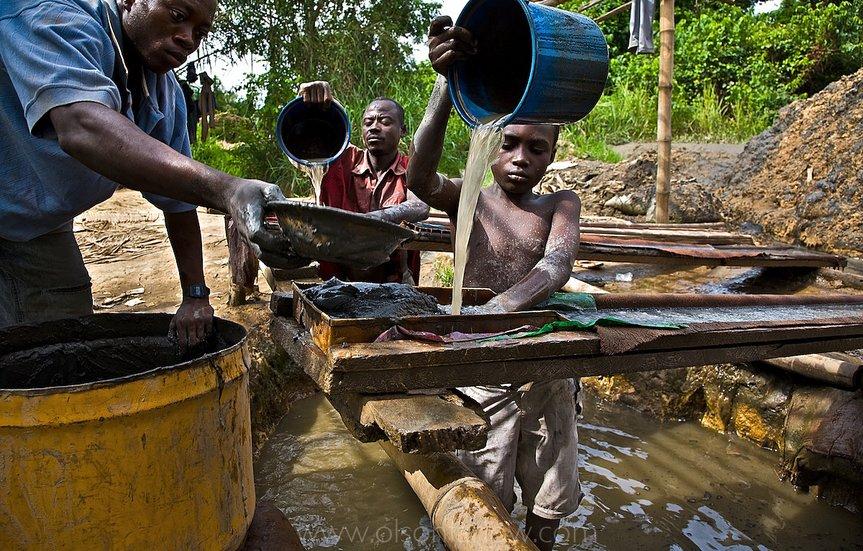
Transportation and telecommunications
Both the transportation and telecommunications sectors in Ghana play pivotal roles in facilitating economic growth, enhancing connectivity, and improving the quality of life for Ghanaians. Ghana has made significant strides in both areas over the years, though challenges remain, particularly in infrastructure, access, and affordability. The transportation system in Ghana has developed considerably, but like many developing countries, it faces challenges in terms of infrastructure, maintenance, and coverage. The transport sector is crucial to the movement of people and goods, both domestically and for trade, as Ghana is strategically located in West Africa. Ghana has a vast network of roads (approximately 65,000 km), but many of these roads, especially in rural areas, are in poor condition due to insufficient maintenance. The majority of the population relies on road transport, making it a key mode of transportation. Ghana has a limited rail network (about 1,000 km) that was once extensive but has since deteriorated. Rail services are mainly used for the transport of bulk goods, particularly minerals from mining regions to ports like Tema and Takoradi. Ghana is home to several international airports, with Kotoka International Airport (Accra) being the busiest and serving as the primary gateway for international flights. The airport has expanded and modernized over the years to handle increasing air traffic. Ghana has two major seaports – the Port of Tema and the Port of Takoradi. The Port of Tema is the main commercial port, handling imports and exports, including crude oil, cocoa, timber, and other goods. The Port of Takoradi primarily handles bulk commodities like manganese and bauxite. Ghana has made tremendous progress in the telecommunications sector, with high levels of mobile phone penetration, internet access, and digital services. The sector is one of the most developed in West Africa and is increasingly driving innovation and economic development.
